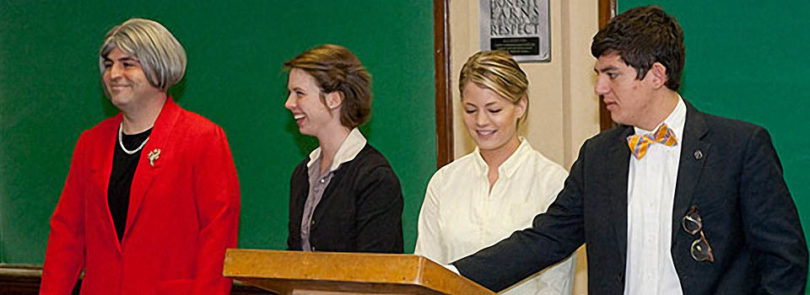When two African-American students integrated UGA a half a century ago, no one dreamed that one day a class would re-enact the event and its social context. That’s exactly what happened in Barbara McCaskill’s English and African American Studies 4880 class this semester as students worked towards a richly textured and deeply researched reaction to events that helped bury the injustices of Jim Crow in the South.
The class is part of a relatively new pedagogy called Reacting to the Past. “Reacting,” according to UGA’s website for the program, “consists of elaborate games, set in a specific time and place. Students play sustained roles in a structured four-week game, speaking and writing in character on issues of the day.”
“For the first part of the semester, we talked about the background of the events surrounding the desegregation of UGA, and then students created characters they could play in the game,” said McCaskill. “One of the really interesting things about the game was that students were asked to step outside their comfort zones. For instance, men played women, whites were black characters and others were asked to represent a political position that didn’t represent her or his own position at all.”
While most students were aware of tragic moments in the civil rights movement, including the assassinations of key figures such as Martin Luther King Jr. and Medgar Evers, many of them had a much harder time understanding Southern society in the 1950s and ’60s when it came to race.
“One question they asked a great deal is how educated, informed citizens could embrace segregation,” said McCaskill. “And they learned that during the Jim Crow era, there was a society in the South built on paradoxes and contradictions.”
McCaskill’s class was deemed so successful, that she’s teaching it again during Maymester.
Reacting to the Past was introduced at UGA in fall 2003 and has now been used in Greek, Latin, English, classical culture, theater and drama, speech communication, comparative literature, political science, religion and women’s studies courses at UGA.
So far, almost 1,000 undergraduates, some of whom serve as student preceptors the following year, and 25 faculty have been involved with Reacting classes at UGA. Reacting has been introduced into Residential Colleges, Student Learning Communities, first- and second-year composition classes, Honors classes and a study-abroad program.
Once the game begins, students run each session, while the instructor advises and guides them on research topics pertinent to the game and grades their oral and written work. In character during a four-week period, students conduct research and then deliver persuasive speeches in an assembly, as they debate and negotiate issues of the day. More than 250 colleges and universities use Reacting pedagogy in some manner. McCaskill hopes the UGA desegregation “game” will one day be played by student groups worldwide to show others how society changes.






